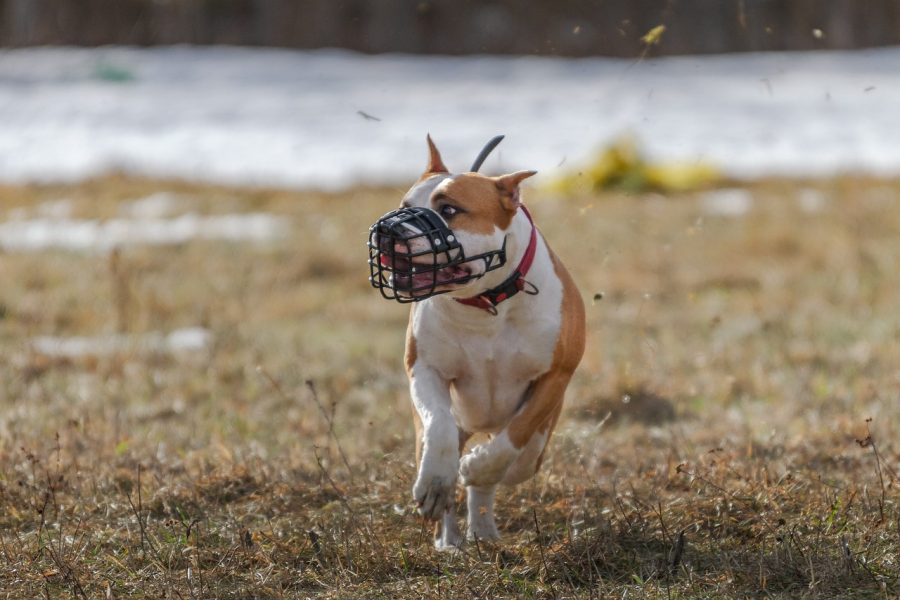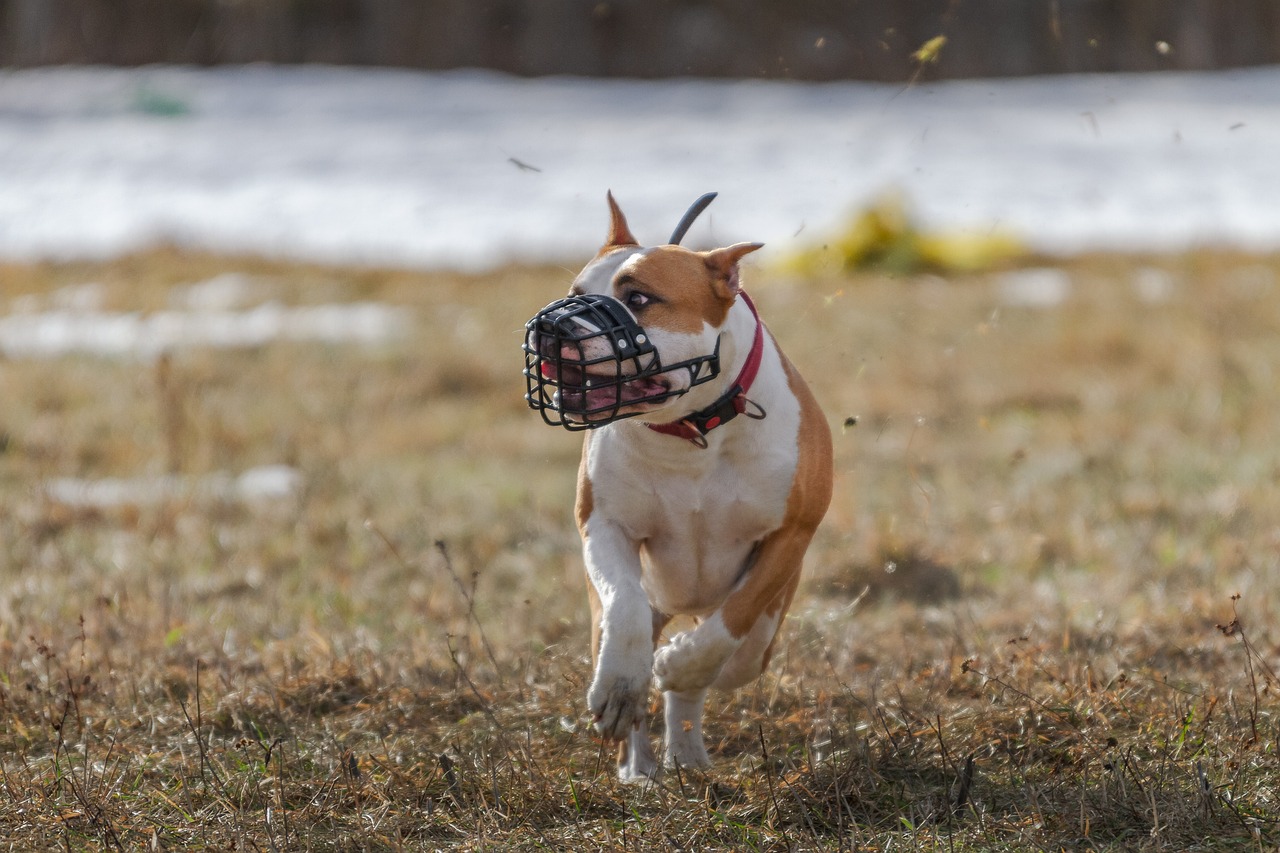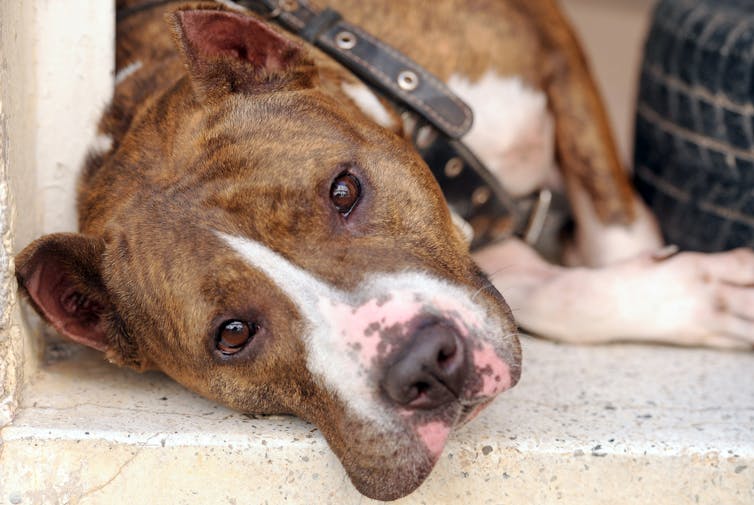
Pit Bull Attacks in South Africa Leave 3 Children and 1 Mother Dead
A horrific string of pit bull attacks in South Africa which saw three children and a mother mauled to death in a fortnight, has led to an angry nationwide petition to ban the breed. Over 133,000 furious people have so far signed it which will be sent to the Government to bring an end to […]

A horrific string of pit bull attacks in South Africa which saw three children and a mother mauled to death in a fortnight, has led to an angry nationwide petition to ban the breed.
Over 133,000 furious people have so far signed it which will be sent to the Government to bring an end to the dogs used to protect homes in South Africa against the high crime.
In a bitter backlash pit bulls feared to be dangerous are being poisoned, stoned, stabbed and set alight; and terrified owners are handing them in to animal charities to save them.
The first child to die was Olebogeng Mosime, 8, who was playing in his garden when he was attacked in Bloemfontein, Free State Province, by his neighbour’s dog who savaged him.

The dog had vaulted a fence and grabbed Olebogeng by the neck, dragging him across the yard whilst biting at his body… until men with shovels intervened and beat the dog off the boy.
A grieving relative said: “You could see his bones and he was ripped to bits around the throat and upper body. It was terrifying and nothing could be done for him”.
South African police are investigating the mauling and the owner faces arrest and jail.
The horrific attack on November 12 was followed eight days later when tragic Keketso Saule, 3, from Henneman, Free State Province, was attacked by two pit bulls.

He had been playing with friends outside his neighbour’s home when they escaped from their garden and according to witnesses, the toddler was literally being “eaten” by the dogs.
It took two minutes to get the boy free and only when a local poured boiling water over the mauling pit bulls. They dragged the little child away by his leg… but his face had tragically been torn off.
His aunt Nthabeleng Saule said: ”His mother witnessed it and had someone not got the dogs off Keketso they would have finished eating him. His face was just gone”.
Locals stoned one dog to death and set it alight, and the Society for Prevention of Cruelty to Animals put the other pit bull down. The owner was arrested and faces jail.
Three days later on November 23 toddler Reuben le Roux was the next victim when his mother Maryke, 37, took him to a neighbour’s home at Gonubie in Eastern Province.

She was feeding her son cake on the porch when her neighbour’s pit bull suddenly went for him and grabbed him by the throat and dragged him 10 feet across the yard.
The owner managed to free the boy, who was covered in blood, by sticking her fingers up the nose of the pit bull called Whisky, and the boy was rushed to a nearby hospital.
Mum Maryke said: ”His heart stopped beating when we got him to hospital. I’m broken. This dog just came around the corner and grabbed him by his neck. I have lost him”.
The 15-month-old child’s death led to the farm owner banning all 20 families living on the property from owning pit bulls, and the dog was taken by the SPCA and euthanized.
The fourth fatal attack of the month happened when mother-of-three Zimkhitha Gaga, 37, was walking to work last Sunday when three pit bulls attacked her in the street.

The dogs had escaped from a garden and tore into her so savagely on the roadside that witnesses could do nothing but call the police who found her dead in a pool of blood.
Gaga – who was head chef of restaurant Judy’s Kitchen in Port Alfred, Eastern Cape – was beyond help and her face, throat and upper body and arms and legs were savaged.
The owner of the three pit bulls faces arrest and jail and has handed the three dogs into the SPCA for fear that locals will attack and kill them as the breed is being targeted.
On November 13 a young girl was also horrifically savaged but was lucky to escape with her life although terribly injured when three vicious pit bulls attacked her in Cape Town.
Locals used rocks and stones to beat the dogs off and kill them, then lined them up beside each other and set them on fire while their victim was rushed to hospital.
In September the Sizwe Kupelo Foundation, run by a government official when off duty to help those in need, launched a petition to ban pit bulls after they killed Storm Nuku, 10.
He was brutally mauled to death at the family home in Gqeberha in Eastern Cape by their two guard dogs which both had to be shot dead by the police.
Mr Kupelo said:
“We are not animal haters but are calling on the current leaders in Government to ensure everyone has a right to life as our Constitution guarantees. The Government must end this slaughter by banning pit bulls.
“It won’t bring back the little ones or those adults who have lost their lives but we are also calling on law enforcement agencies to ensure dog owners are held to account.
“The courts should send a strong message to other pit bull lovers by sentencing owners of dogs who attack and kill people to lengthy prison terms to protect us all.
“We need to follow in the footsteps of other countries and ban this breed.
“This is four people killed in this month but doesn’t take into account all those victims who have been savaged and survived or lost limbs or left terribly scarred for life.
“Those who oppose my petition are not offering any alternatives that make sense. When these dogs go there is little to stop them and children have no chance.”
The call for a ban in South Africa comes as countries like the UK, Russia, Finland, Denmark, Portugal either banned pit bulls or put strict restrictions on the breed.
The Pit Bull Federation of South Africa’s spokesman Lin Rautebach said: “Many of these problems are linked to the irresponsible breeding and ownership of power breeds. There needs to be tighter regulation and enforcement of these regulations.”
The City of Cape Town alone in the last 15 months has impounded over 800 dogs, and many are linked to illegal dog fighting gangs where the pit bulls fight to the death.
The National Council for the Society of Prevention of Cruelty to Animals said their charity is being deluged with large numbers of pit bulls being abandoned at their bases.
Spokesman Keshvi Nair said: “Pit bulls are being surrendered to us and in communities where owners do not surrender them then locals take matters into their own hands.
“Animals are being poisoned, stabbed, beaten and set alight in retaliation from angry communities where they have attacked others and we call for this to stop,” she said.
A Government spokesman said: ”We cannot comment until we receive this petition and if the law has to be changed under the Animal Protection Act we will act accordingly. It is the line of duty for every dog owner to ensure their dogs are never out of control.”
The powerful Congress of South African Trade Unions (COSATU) also backed the ban saying: ”We fully support the petition and there is a need to ban these vicious animals.
“This has spawned an industry of illegal breeding and of dog fighting syndicates run by gangs and we need to follow the lead of other countries to ban this breed of dogs”.
The petition to ban pit bulls stands at 132,552 and will be handed in to the Government on December 15 to try and ban the power breed as a domestic pet in South Africa.
To use any of the text or photos, please contact Jamie Pyatt News Ltd.
Pit bull attacks in South Africa – a historian sheds light on the issues – from The Conversation

By Sandra Swart, Stellenbosch University
Pit bulls have been in the news in South Africa after a series of deadly attacks on humans by the dogs. There have been revenge attacks on the dogs and politicians have called for their ban – tapping into a history of dogs being used by their white owners to intimidate and attack black South Africans. A racist incident then made the news when a dog lover responded with fury to the call for a ban. Sandra Swart is a South African historian who specialises in the history of dogs in society. We asked her to shed some light on the issues.
Is the pit bull a dangerous dog or is it being scapegoated?
A little of both. At the moment we are facing a real crisis coupled with a social panic. The attacks are a real problem and to solve it we can and must learn from history. History shows us the dangers of a social panic are two-fold: overreaction (to satisfy public outrage) and under-reaction (in favour of short-termism that avoids dealing with the bigger problem).
So first, we need to understand the history of pit bulls (which were bred, originally in England, for bull-baiting, a blood sport where bulls tied to an iron stake were savaged by dogs) and then imported to South Africa, mainly from the 1970s, where they were further bred – some as guard dogs, some as pets, some for illegal dog fighting rings.
They have also been bred to have high pain thresholds. Their behaviour is perhaps 60% genetic but remember, dog behaviour is flexible and can be drastically modified by training and experience, especially between three and 12 weeks. Moreover, their training is often derelict or intentionally aggression-inducing – as they are often used as extensions of toxic masculinity, as status symbols with teeth.
That said, there are plenty who are genuinely family pets who are unlikely to inflict harm. If they have a personal history of unwarranted aggression towards people it is safer to euthanise. If an owner is worried (and they should be), they should get their dog assessed by the SPCA or a qualified dog behaviourist. But that does not solve the bigger societal problem.
What can we learn from history?
Whatever the state decides to do now, the public must realise that previously other breeds were also held to be too savage for South African society. In the 1920s, German shepherds – or so-called “wolf dogs” – were considered a scourge. There were later waves of concern over boerboels. In the winter of 1983, hackles were raised when the town of Parow tried to ban rottweilers, dobermans, bull terriers and mastiffs. Vets were quick to point out that Labradors and Pekinese were responsible for most bites though. In fact, any power breed (strong, muscular frame, broad head, bite-and-hold fighting tactic) and, indeed, most dogs can inflict harm or death to a human.
There are long term legislative actions that can be taken. The first is breed specific legislation (banning certain breeds), the other is dangerous dog laws (which target bad behaviour rather than bad breeds).
Breed specific legislation is being strongly pushed for currently, but while it feels suitably dramatic, history suggests it simply does not work. The concept has been around for a century – since 1929 when some parts of Australia banned German shepherds. After several maulings in the 1980s, the UK imposed legislation in 1991 banning pit bulls but the number of dog bites stayed the same – as was the case in different counties in the US. People simply bought other vicious breeds.
Remember, “pit bull” is not a clearly defined genetic category. A lot of identification is simply perception. There are at least ten breeds frequently mistaken for a pit bull (which also leads to over-reporting them as perpetrators). Equally, if pit bulls were banned tomorrow and the cries for their immediate execution were heeded, many innocent dogs would be killed unnecessarily. Moreover, what to do with cross-breeds – half pit bull and half miniature schnauzer, for example: euthanise them too?. This would be an ethical outrage. But it would also be pointless, because a banned breed can simply be renamed something else and the danger continues.
Moreover, breed specific legislation ignores behavioural and other biological aspects: the aggressive dogs are much more likely to be male, be intact (unneutered), and most likely to be unsocialised (including kept on a chain usually) or actively encouraged in aggression.
So this legislation is both over-inclusive (it includes lots of gentle dogs) and under-inclusive (it misses a lot of vicious dogs). It is easy to legislate, but impossible to enforce. It is popular but provides a fake sense of security.
And dangerous dog laws?
Dangerous dog laws are complex, not such good public relations and they are expensive and require hard work. But dangerous dogs laws do work. They look at the prior behaviour of the individual dog, and they can be tweaked to include more focus on dogs from “power breeds” or dogs over a certain size. They are not a quick fix but, over time, they work by putting the responsibility over the dog squarely with the owner. It is like owning a gun – if you are negligent with that firearm, and someone gets hurt, you are criminally liable and face serious consequences including prison.
There are a lot of ideas to draw on here, including requiring special permits, requiring special liability insurance and mandatory sterilisation for power breeds, or dogs over a certain weight, or known offenders. Micro-chipping and keeping a database of previous offences would mean dogs would be punished for their own
bad behaviour rather than their breeds, which are hard to define genetically. Each case can be evaluated on its own merit then. It also requires private-public partnerships. Also, the state needs to vigilantly uphold anti-roaming laws, in partnership with the SPCA. They might not stop all dog bites, but they would greatly reduce fatalities.
What deeper historical issues does the subject trigger?
Something does linger in the South African mind about dogs. Our national psyche is troubled. Nothing remains as strong in the public’s imagination as the snarling German shepherd straining at the end of the apartheid policeman’s leash. There is a deep ambivalence about dogs in South Africa and we need to understand why that is.
There is a strangeness in the relationship between dogs and humans, and between humans and humans over dogs. I reveal the history of this strangeness through the police dog as a lens, in my forthcoming book – The Lion’s Historian. Through misuse of police dogs (and also often privately owned dogs) as agents of control in the police and bio-surveillance in the suburbs, big dogs became signifiers of anxiety and stereotypes that white and black people have of each other, especially the terror of the police dog.
In fact, “police dogs” were only used on purpose for attack after 1961, for crowd control. For fifty years before, police dogs were only allowed to be smell detectives in the state’s police – never attack or hurt anyone.
Something we can do is invert this old apartheid model and do totally different canine educational roadshows at schools. Most victims are children. Teaching both good dog ownership skills and safe behaviour around dogs would help a little.
What else can be done?
The Hawks, South Africa’s priority crime division, need to break the illegal dog fighting rings, working closely with the SPCA (who already do so much). Once dog fighting is stopped for good, there will be less incentive to breed for aggression, and more money in breeding pit bull lines that are family friendly. Breeding strictly with behavioural testing against aggression will help. Other breeds, like the old English bull dog, also descend originally from fighting stock. Only once the authorities cracked down heavily on their fighting, was there was less incentive to perpetuate the aggressiveness in the breeds – and now they are famously gentle family pets. Of course, there are already breeders who focus on friendly, gentler lines in pit bulls, so the genetic material is there.![]()
Sandra Swart, Professor of History, Stellenbosch University
This article is republished from The Conversation under a Creative Commons license. Read the original article.
